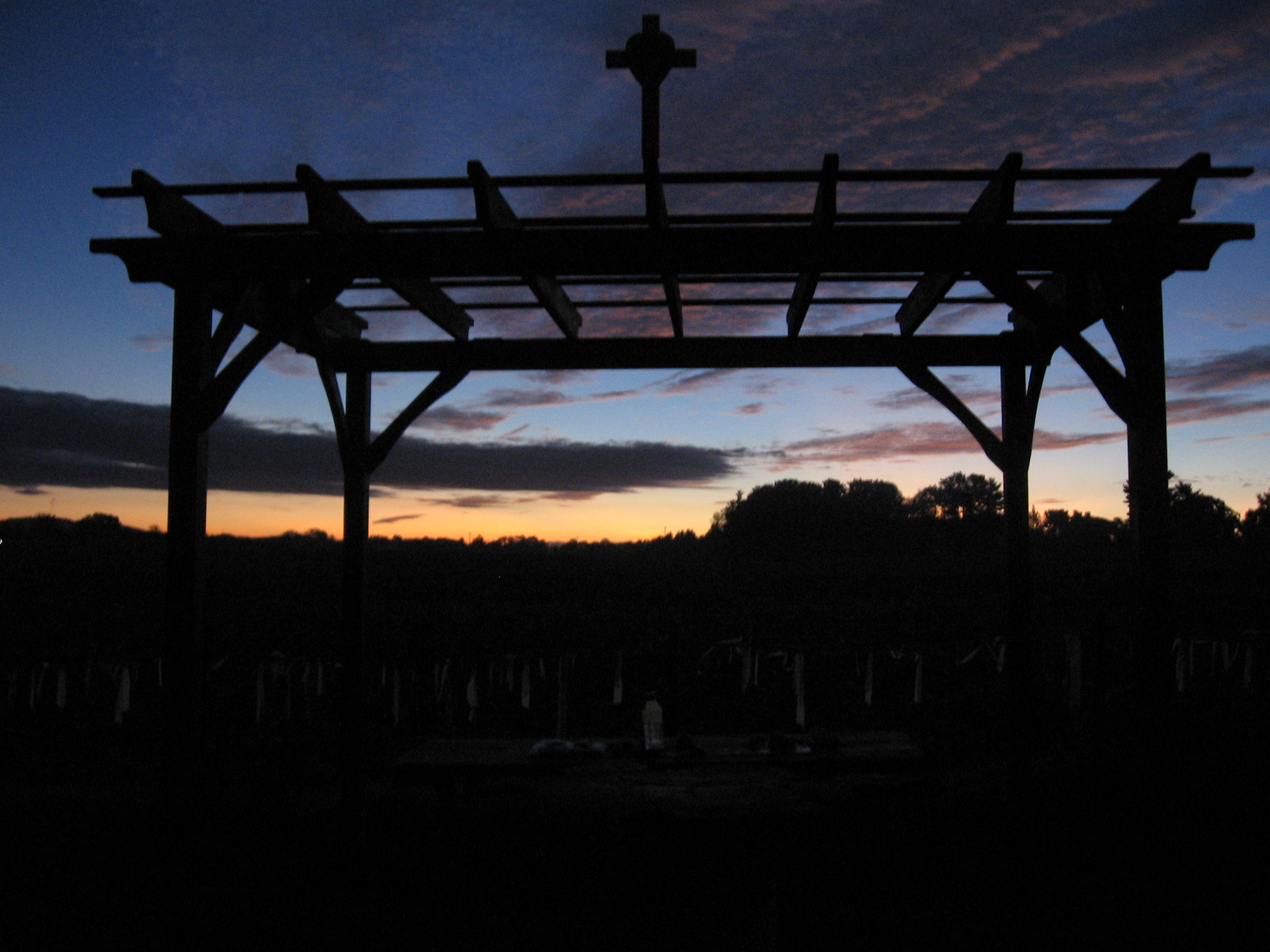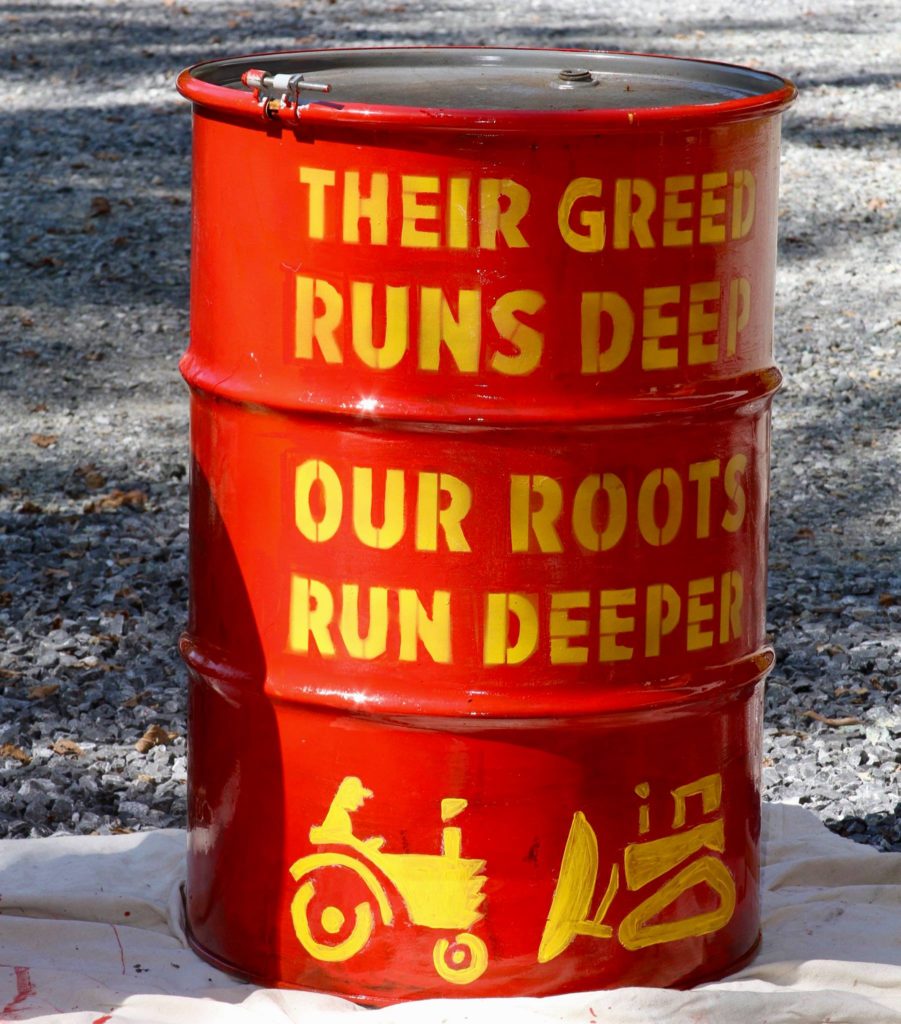The Patient Body
Industrial Strength Moral Compass
“The Patient Body” is a monthly column by Ann Neumann about issues at the intersection of religion and medicine. This month: Faith leaders joining the environmental movement.

The Adorers of the Blood of Christ Chapel at Dawn.
Photograph by Anne Sensenig“Praise be to you, my Lord, through our Sister, Mother Earth, who sustains and governs us, and who produces various fruit with colored flowers and herbs.” —Canticle of the Creatures, Francis of Assisi[1]
On November 16th, at a press conference held in Albany, NY by a group called the Sheridan Hollow Alliance for Renewable Energy, Reverence McKinley Johnson told attendees, “It’s a shame that we always, in our communities, seem to be the acceptable casualties, meaning that we don’t matter, it don’t make any difference because [it’s] what’s best for other people.” Johnson was condemning Governor Andrew Cuomo’s proposal to convert an existing energy plant in Sheridan Hollow, a low-income community of color in a ravine north of downtown Albany, to fracked gas.
The energy from the factory conversion would be used to power Empire State Plaza, the site of several of the state government’s administrative buildings. It would also make use of fracked gas, a controversial and polluting fossil fuel piped in from other states. Fracking is currently banned in New York. Johnson, who is the president of the Albany African American Clergy United for Empowerment, a collective of 26 predominantly African American churches in New York’s state capital, called out to the press conference gathering, “It’s not right, it’s not right.” The crowd responded in unison, “Amen.”
Throughout the 1980s, the plant incinerated garbage, raining black ash down on Sheridan Hollow residents, until Mario Cuomo, the current governor’s father, closed it in 1994. Speakers at the conference speculated that more than a decade of pollution from the plant has caused high rates of cancer and other illnesses in the community.[2]
As the Trump administration continues to strike climate change from one agency agenda after another, Christian faith leaders from various denominations are stepping up to denounce the effects of industrial pollution and energy generation on their communities, the country, and the world.[3] From Pope Francis’s Laudato Si’ encyclical to Reverend Johnson’s press conference statements, church leaders have decried the injustices of our current energy policies on the health of the human population, often noting the role that capitalism (the Pope) and racism (Johnson) play in energy infrastructure and generation.
These faith leaders are bringing a new moral weight to the conversation—if we could indeed say it’s a conversation in this highly politicized era—on the inequities of climate change. Rather than allow issues of pollution and energy infrastructure to be framed by corporate profit, faith leaders are identifying our current practices as immoral, unethical and detrimental to the most vulnerable.
This movement has proven to be nimble, able to partner with existing green or “outdoors” organizations and industries. As well, it has built on prominent themes that came out of the 2016 election campaign—namely racial and economic injustice—to identify and make personal the hazards of continuing current methods of energy consumption and production.
***
Last fall, CBS Religion & Culture produced a 30-minute series on the role of faith in combatting climate change, Protecting the Sacred: Water, the Environment, and Climate Change. Producer Liz Kineke interviewed scientists, theologians, and activists to examine how faith leaders have begun to address climate change. The documentary highlighted how Native faith guided tribes during the Standing Rock protests, when hundreds of people were assaulted and mistreated. Kineke also visited a group in Lancaster, Pennsylvania, that is fighting the construction of a pipeline that will transport fracked gas to the Chesapeake Bay for export.

Lancaster Against the Pipeline Nonviolent Mass Action Training
(Photograph by Becky Gardner)
Lancaster Against Pipelines (LAP) was founded to prevent an Oklahoma-based corporation, Williams Partners, from seizing their private property for construction of a pipeline, cheerfully named the Atlantic Sunrise. Emboldened by lax energy policies, the easy co-optation of local and municipal resources, and the complicity of courts—Williams swept into the county relatively unchecked. Lancastrians who were unaware of the company’s methods, who had limited resources, and were intimidated by the company’s agents, were no match for the multibillion corporation. (See my full disclaimer in the footnote[4] below.)
In Lancaster, one of the properties crossed by the Atlantic Sunrise is owned by a Catholic order of women religious, the Adorers of the Blood of Christ. They have lived on that land for more than 100 years.
The sisters have opposed the pipeline from the beginning, but their story highlights the ways in which corporations use complicated processes and eminent domain to get their way. Because the US government has favored increased fracked gas production, corporations, claiming public utility status, have been able to use eminent domain to override residents’ property rights. The sisters, like hundreds of other Lancastrians, thought that the pipeline couldn’t be built without their consent. They were wrong. The company has argued that the Sister’s lack of response to early requests for information was the same as consenting to the project.
Last fall, LAP and the Adorers built a prayer chapel in the path of the pipeline, which led to protests, dozens of arrests, and national media coverage.
The Adorers also filed a federal lawsuit, stating that the Federal Energy Regulatory Commission violated their religious freedom by approving the construction of the pipeline across their property. Williams responded by beginning construction on the Adorers’ property first; if it’s already in the ground, what good is a pending lawsuit?
A Pennsylvania district judge, Jeffrey L. Schmehl, the same judge who approved Williams Corporations’s use of eminent domain to seize property for the pipeline, dismissed the Adorers’ lawsuit. They immediately appealed.
Oral arguments in their case were heard on Friday, January 19 in Philadelphia. “The Sisters are challenging the use of eminent domain for the Atlantic Sunrise fracked gas pipeline, since it’s forcing them to use their own land in direct violation of their deeply held religious convictions regarding the Earth,” read a statement on LAP’s Facebook page. The judges seemed, according to LAP members in attendance, unsympathetic to the Sisters’ religious convictions. One stated that he felt the Sisters should have opposed construction sooner—an acknowledgement on the court’s part that they do not understand the coercion and opacity of the pipeline corporation’s manipulation of the “permission” process. A decision on the case is still pending as of publication.
***
Pipeline construction continues, in Lancaster County and all across the country. Still, the addition of faith leaders to the ecological movement has significantly raised the visibility of such projects and made the immoral and unethical actions of such corporations’ starkly clear. The prominence of faith leaders’ voices undermines the Republican Party’s seeming cooptation of American religion for it’s own political purpose, thus eroding the party’s unfounded or overblown claims of progress, job creation, and safety. Faith voices also expose the human costs of the industry’s ruthless advancement.
 Another effect of national religious efforts to stop pipelines, like the one in Lancaster, is the attention they’ve brought to the racially unjust practices and placement of the country’s energy infrastructure. As Mark Clatterbuck, one of the founders of LAP has pointed out, pipelines must travel from A to B and in doing so, they are not contained in minority communities but cross through neighborhoods both tawny and working class, white and minority, urban, suburban and rural. Opponents of these projects are forced to face the injustice of energy infrastructure in less privileged communities, and work with others outside their immediate racial or economic group, making economic and racial disparity starkly evident.
Another effect of national religious efforts to stop pipelines, like the one in Lancaster, is the attention they’ve brought to the racially unjust practices and placement of the country’s energy infrastructure. As Mark Clatterbuck, one of the founders of LAP has pointed out, pipelines must travel from A to B and in doing so, they are not contained in minority communities but cross through neighborhoods both tawny and working class, white and minority, urban, suburban and rural. Opponents of these projects are forced to face the injustice of energy infrastructure in less privileged communities, and work with others outside their immediate racial or economic group, making economic and racial disparity starkly evident.
Like the plant in Sheridan Hollow, a low-income, minority community where opposition is hard to muster among residents who are already encumbered by the difficulties of daily living, and the Dakota Access Pipeline, which was rerouted through Native lands so that any spills, explosions or leaks would not affect the city of Bismark, the story of energy corporations’ absurdly enormous profits and decimating pollution is the story of systemic corporate and governmental injustice. When faith leaders proclaim such injustice as immoral, they tap into a grass-roots network already in existence, they make visible the devastating practices of the fossil fuel industry, and they highlight our country’s devastating complicity with unscrupulous corporations. They also undermine the current religious power dynamics in government.
At the same time, the Adorers and faith leaders like Johnson have made it harder for corporations (and their allies) to denigrate project opponents as crusty, granola-eating hippies of yore. And the credibility, rightly or wrongly, that they bring to the conversation about the industry’s practices have changed the dynamic in communities large and small.
Those effected by new projects are learning from LAP, making creative alliances, and employing more effective techniques to gather communities together to stop proposals before they start. But as we become increasingly aware of the ecological and safety hazards of wholesale destruction for corporate profit, we also realize how very entrenched political and corporate power are, unrestrained by our laws and regulations, making the “higher” power of religious communities one of the few sources of hope.
***
[1] From Early Documents, vol. 1, New York-London-Manila, 1999, 113-114. Quoted in the opening paragraph of Pope Francis’s 2015 encyclical Laudato Si’: On Care For Our Common Home,
[2] For more information, you can call Cuomo’s office at 877-235-6537, a hotline set up by Sheridan Hollow Alliance for Renewable Energy (SHARE)
[3] I’m specifically referring to Christian denominations for the purposes of this piece, but many other faith groups across the country are focusing on the dangers of climate change, like DC Green Muslims (http://dcgreenmuslims.blogspot.com), and the Buddhist organization The Earth Sangha (http://fore.yale.edu/religion/buddhism/projects/earth_sangha/).
[4] Malinda and Mark Clatterbuck, two of the founders of Lancaster Against Pipelines, are my sister and brother in law. I spent much of last year working with LAP. Lancaster, Pennsylvania is my hometown.
***
Past “The Patient Body” columns can be found here.
***
Ann Neumann is author of The Good Death: An Exploration of Dying in America (Beacon, 2016) and a visiting scholar at The Center for Religion and Media, NYU.
***
Published with support from the Henry R. Luce Initiative on Religion in International Affairs.